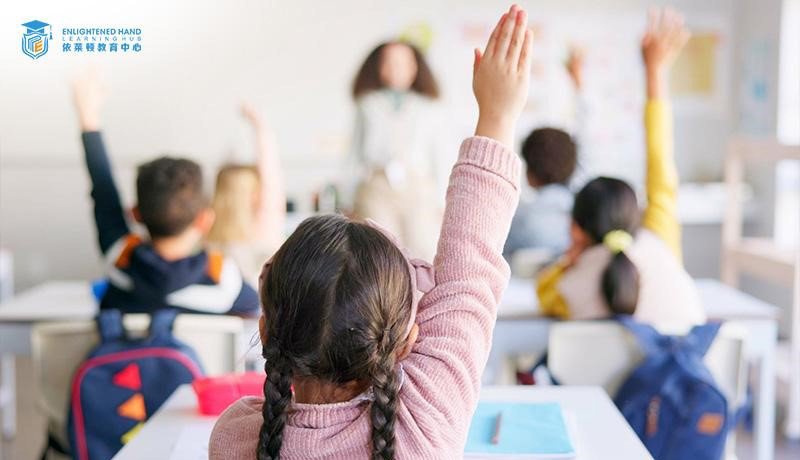In Singapore, education is widely regarded as the key to unlocking a child’s full potential. But the truth is, success isn’t just about textbooks and exams—it’s about becoming a well-rounded individual who is ready to conquer whatever comes their way. This is where enrichment programmes in Singapore come in, giving young learners the opportunity to develop essential life skills while strengthening their academic foundation. From building confidence in English, Math, and Chinese to fostering curiosity and creativity, enrichment is all about empowering students to thrive in all areas of life.
In this article, we’ll take a closer look at how enrichment classes for primary school students set the stage for success, and share tips on how to choose the right one for your child.
The Role of Enrichment Programmes in Primary Education
Understanding Enrichment Programmes
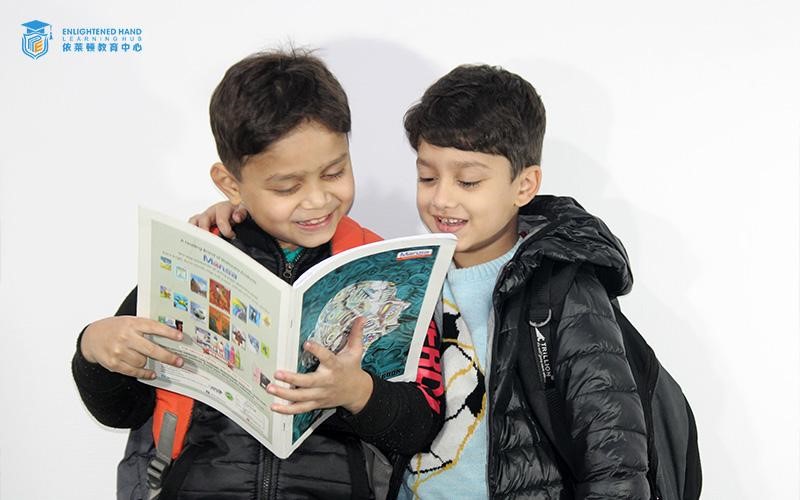
Enrichment programmes in Singapore are designed to complement the core school curriculum by diving deeper into subjects and skills. These classes aim to bridge the gaps in standard classroom teaching, offering a more holistic and engaging approach to learning. Students can explore topics like maths and language, all customised to their individual pace and style of learning.
While traditional tuition is focused solely on improving grades, enrichment programmes for young learners take things up a notch. They prioritise vital skills such as critical thinking, problem-solving, and emotional intelligence. Here, children build confidence in their abilities, feel more prepared for challenges, and develop a deeper love for learning.
Benefits of Enrichment for Primary School Students

1. Boost Academic Performance
Enrichment programmes provide valuable after-school academic support by tailoring learning experiences to students’ needs. For instance, primary school English enrichment classes may focus on improving grammar, enhancing vocabulary, and refining writing skills. They may also incorporate engaging activities like storytelling and conversational practice to make language learning more dynamic and enjoyable. Tutors may also help weaker students identify specific areas of difficulty and address them through one-on-one guidance. This ensures that every child has the chance to improve at their own pace and allows them to become more confident in tackling challenges.
2. Promote Holistic Development
Enrichment programmes are all about holistic child development. Activities such as group discussions teach children how to articulate their thoughts while listening to others, fostering empathy and collaboration. Hands-on projects, like crafting models or conducting experiments, also nurture creativity and resilience, preparing students for both academic and real-world situations
3. Encourage Lifelong Learning
By creating opportunities for hands-on exploration and discovery, enrichment programmes ignite a love for learning that lasts a lifetime. Creative learning activities for primary school students, such as designing their own board games or participating in interactive experiments, encourage them to think innovatively. These activities spark curiosity, showing students that learning is not confined to textbooks but is a dynamic and enjoyable process. This mindset equips them to approach new challenges with enthusiasm and an open mind.
Key Enrichment Programmes for Primary Students
Academic Enrichment in Core Subjects
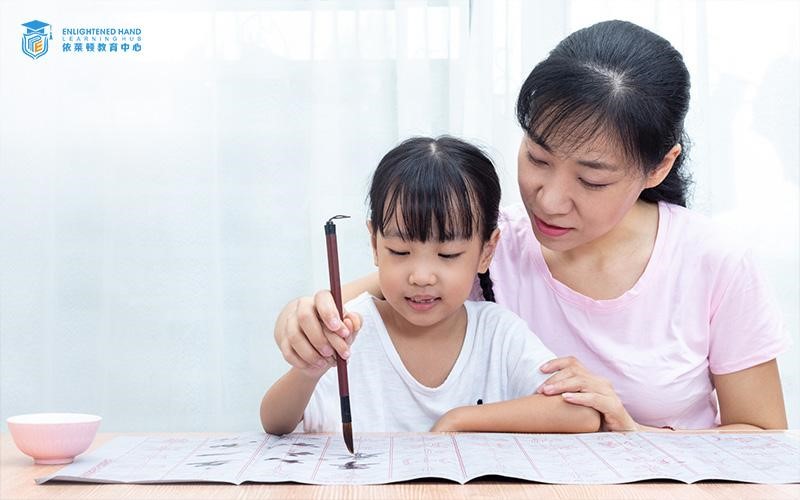
Core subjects form the backbone of a student’s education, and enrichment programmes aim to strengthen these essential skills:
1. English Enrichment
Language enrichment for children is primarily designed to cultivate a strong command of the language. Students work on building a rich vocabulary through activities such as creative storytelling, where they construct narratives using new words, and collaborative group discussions to practice effective communication. Exercises like essay writing hone sentence structure and writing skills by teaching students to articulate their thoughts clearly and persuasively. Additionally, students practise comprehension through analysing texts, which improves their ability to infer, summarise, and critique—skills that benefit them across all subjects.
2. Math Enrichment
Math often becomes a source of anxiety for young learners, but math enrichment programmes can transform it into an engaging and interactive experience. These classes utilise hands-on activities like puzzles, logic games, and real-world problem-solving scenarios to make abstract concepts tangible and fun. For instance, students may work together to design budgets for a fictional event or build geometric models, helping them understand how maths applies to everyday life. Through these group games, enrichment programmes encourage collaboration and healthy competition, motivating students to tackle challenging problems creatively.
3. Chinese Enrichment
Many young students in Singapore find learning Chinese particularly challenging due to limited opportunities for practice and the complexity of its characters. This is where Chinese enrichment classes come in, addressing these difficulties by adopting engaging and practical learning methods. Storytelling sessions introduce students to traditional tales and modern stories, helping them improve listening and comprehension skills while immersing them in the language's rich cultural heritage. Conversational practice, where students participate in dialogues or role-play everyday scenarios such as ordering food or shopping, also helps to build their fluency in spoken Chinese. These dynamic approaches not only improve fluency but also instil a sense of pride and appreciation for Chinese culture, making the learning experience more meaningful.
Preparing for Exams and Assessments
In a highly competitive environment like Singapore, enrichment programmes also offer essential support in helping students prepare for school exams and assessments.
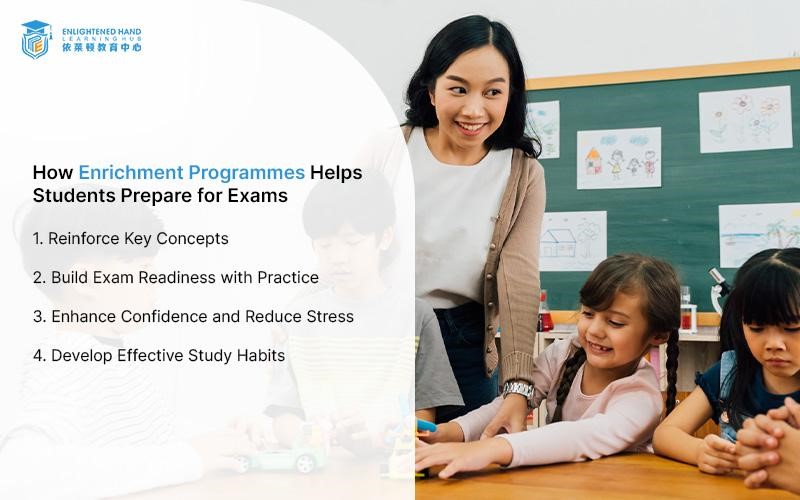
1. Reinforcing Key Concepts
Enrichment programmes help students consolidate their understanding of essential subjects by revisiting key concepts through engaging activities. This approach ensures that students are well-versed in the material, making it easier for them to recall and apply what they’ve learned during exams. By breaking down complex topics into smaller, more manageable sections, students can focus on areas where they may need more practice, giving them a solid foundation to perform better in assessments.
2. Building Exam Readiness with Practice
Through mock exams and practice tests, enrichment classes give students the chance to familiarise themselves with the exam format and learn how to manage their time effectively. This practice helps reduce any nerves about the actual exam, as students feel more confident about what to expect. By simulating real exam conditions, students can also refine their test-taking strategies—such as deciding how to approach difficult questions or how to pace themselves during the exam—giving them the skills to navigate the real thing with greater ease.
3. Enhancing Confidence and Reducing Stress
Enrichment programmes also help boost students' confidence and reduce exam-related stress. Regular feedback and the opportunity to work through challenges help students feel accomplished and reassured about their progress. This positive reinforcement encourages them to approach exams with a calm, focused mindset. Moreover, the supportive environment of these classes helps students view mistakes as learning opportunities, building their resilience and helping them manage stress while facing academic challenges.
4. Developing Effective Study Habits
Enrichment programmes also teach students effective study techniques that will serve them well beyond exam preparation. With structured lessons and guidance, students learn how to break down large amounts of information into more digestible chunks, set achievable goals, and stick to a productive study routine. These skills not only help students perform better in exams but also cultivate discipline and essential time management habits.
Nurturing Emotional and Social Skills

Nurturing emotional and social skills is a crucial aspect of a child’s development, and enrichment programmes provide the perfect platform to foster these abilities.
1. Promotes Collaboration
Enrichment activities for kids, such as group projects and team-based sports activities, encourage collaboration. These hands-on experiences teach children the importance of listening to others, sharing responsibilities, and working towards a common goal. As they work with their peers, students not only learn how to solve problems together but also develop strong communication and interpersonal skills.
2. Fosters Empathy
Through group interactions, role-playing, and guided discussions, enrichment programmes encourage students to step into the shoes of others. This helps them appreciate different perspectives and become more open-minded and compassionate. This fosters stronger, more positive relationships with their peers, enabling them to build a supportive social circle that will be essential as they grow and navigate life.
3. Enhances Emotional Regulation and Resilience
Tutors are there to support students in more ways than just academics—they also help them tackle personal challenges. As students take on group activities and work through their learning journey with the tutor's guidance, they start to build important skills to stay calm during stressful situations. With these emotional tools, they become more resilient, learning how to bounce back from setbacks, push through tough moments, and grow stronger in the process.
Choosing the Best Enrichment Programme for Your Child
With so many enrichment programmes available, it can be difficult to choose one that truly meets your child’s needs and interests. Here are some key considerations to help you select the best programme for your child.
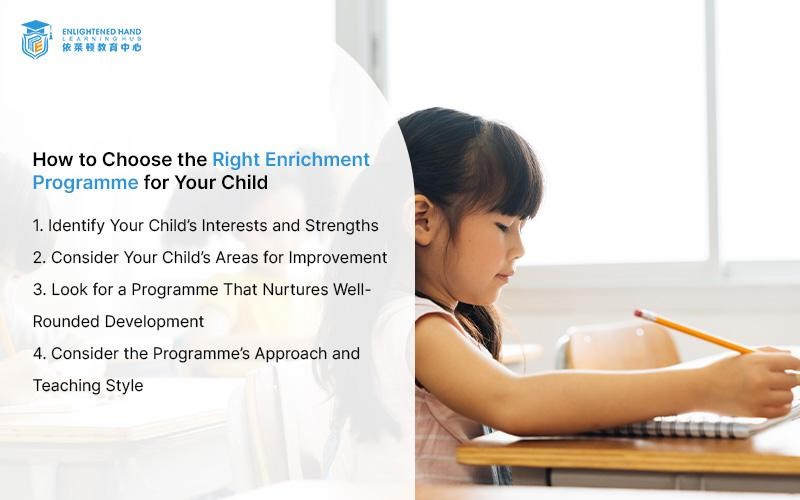
1. Identify Your Child’s Interests and Strengths
When choosing an enrichment programme, think about what excites your child and where their strengths lie. If they love being creative, look for education centres in Singapore that nurture those talents, whether it's in writing, art, or drama. For children who excel in subjects like Math or languages, find a programme that challenges them further, offering opportunities to deepen their knowledge and skills. Focusing on your child’s passions will keep them motivated and engaged in their learning.
2. Consider Your Child’s Areas for Improvement
Enrichment programmes are also a great way to support children in areas where they might need extra help. If your child is struggling with a particular subject like English, Math, or Chinese, seek out classes that can provide targeted support. These programmes can help reinforce key concepts, build confidence, and ensure that your child feels more secure in their abilities.
3. Look for a Programme That Nurtures Well-Rounded Development
It’s important to choose an enrichment programme that focuses on more than just academics. The best classes also foster emotional, social, and creative growth. Look for options that offer a variety of extra-curricular activities for primary school children—these are crucial for cultivating teamwork, communication, and emotional intelligence. By helping your child grow holistically, you’re setting them up for success not just in school, but in life too.
4. Consider the Programme’s Approach and Teaching Style
Every child learns differently, so it’s important to find a programme that matches their learning style. Some children thrive in hands-on, interactive environments where they can actively engage with the material, while others might prefer a more structured, step-by-step approach. Understanding how the programme is taught will help you choose one that suits your child’s needs and makes learning enjoyable for them.
Frequently Asked Questions About Enrichment Programmes in Singapore
1. At what age should enrichment programmes begin?
Starting enrichment programmes as early as primary school helps lay a strong foundation while supporting your child’s personal growth. They can develop key skills like critical thinking and creativity, giving them the tools to succeed in school and beyond. As your child grows and their needs evolve, these programmes can continue to support them, ensuring they’re well-equipped to tackle new challenges in their education.
2. How do I know if an enrichment programme is of high quality?
Look for experienced and qualified instructors who are passionate about teaching and have a proven track record in their field. A high-quality programme should offer personalised learning experiences, providing targeted support for your child’s individual needs. Additionally, a good programme should foster a positive, engaging learning environment and focus on both academic and personal development, ensuring your child benefits from a well-rounded experience.
3. How do I track my child’s progress in an enrichment programme?
A responsible and reputable education centre will provide regular updates through progress reports and parent-teacher meetings. Students may also be given the chance to demonstrate what they’ve learned through engaging projects or presentations. This open communication allows you to stay involved in your child’s journey and make informed decisions about their learning path.
Conclusion

In conclusion, enrichment programmes play an essential role in a primary student’s educational journey in Singapore. They go beyond reinforcing academic knowledge, offering children the opportunity to develop crucial life skills such as emotional intelligence, critical thinking, and effective communication. By choosing an enrichment programme that aligns with your child’s unique strengths and needs, you’re nurturing their confidence and resilience—qualities that will serve them well in school and throughout life.
At Enlightened Hand Learning Hub, we take a personalised approach to enrichment, tailoring our programmes to meet each child’s specific learning style. Our expert tutors work closely with students in English, Math, and Chinese enrichment classes, ensuring they don’t just excel in school but also grow as well-rounded individuals. With homework guidance, after-school care, and exciting holiday programmes, we help students build the skills they need to tackle future challenges with confidence.
Get in touch with us today.




